Thief Review
A clumsy reboot that fumbles the loot
Let us take a moment to solemnly remember Looking Glass Studios, tragically torn away from us in the year 2000 when Eidos Interactive suffered a catastrophic monetary failure. For the most part Looking Glass churned out competent games that nobody really cared about – mediocre sports games and flight sims and the like – but every once in a while something extraordinary happened. Maybe the company was struck by lightning, or the creative director opened another mysterious unmarked package full of white powder, or the resident cockroaches gained hive-mind sentience and started writing design documents on the walls using only their chitinous writhing bodies. Whatever the cause, every now and then Looking Glass Studios would produce pure ground-breaking cult-classic brilliance: Ultima Underworld, the System Shock series and, most significantly of all for the subject of this review, Thief: The Dark Project.
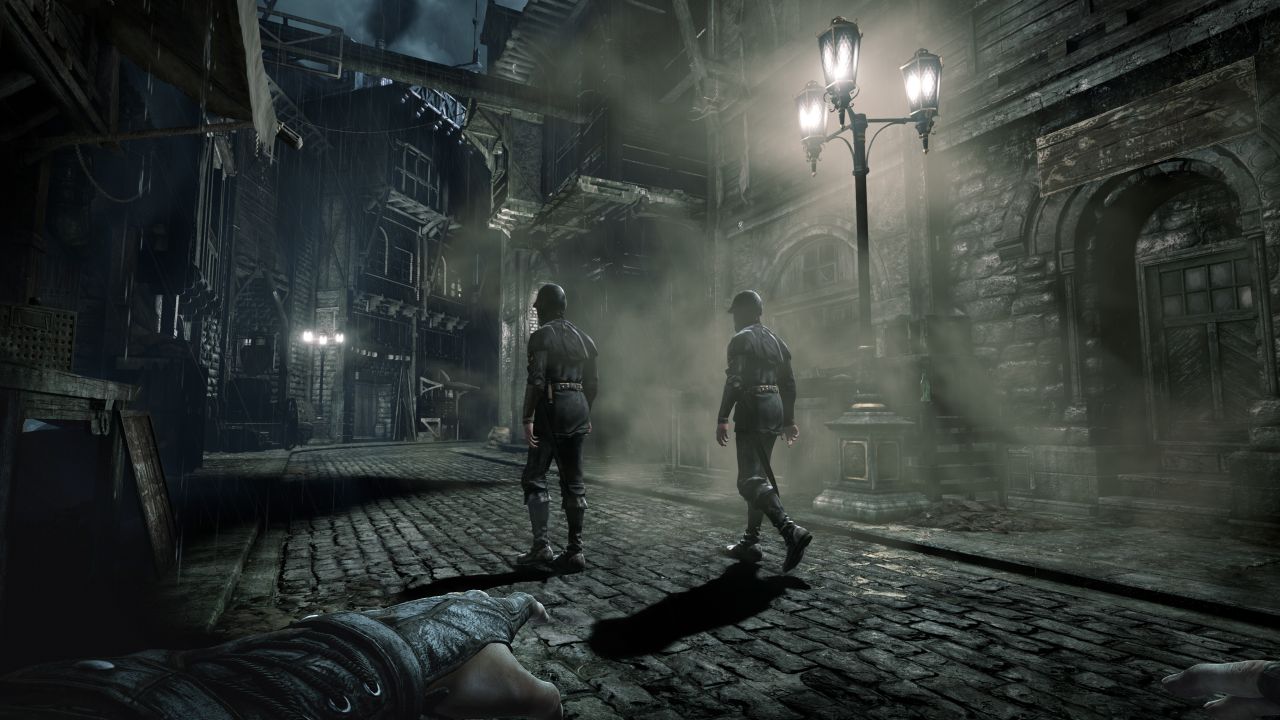
Thief was an anomaly in the distant year of 1998, being a first-person game where your primary objective wasn't the obliteration of everything uglier than you and your primary weapon wasn't a gun the size and shape of several industrial power tools lashed together. Looking Glass evidently didn't have confidence in the prospect of a first-person stealth-em-up selling well in an era when the spectre of the term 'Doom-like' was still hanging over everybody's shoulders, and subsequently pumped Thief's every spare orifice full of zombies and dinosaurs to fulfill the national minimum mindless action quota, which naturally went down about as well as a cyanide pill slathered with Wasabi paste. Looking Glass actually took feedback on board for the much sneakier sequel, Thief II, which is widely accepted as the high point of the series and one of my favourite games of all time, while Thief is now largely remembered as a warning of the dangers of attempting widespread appeal in a game destined for a niche audience. Goodness me, a Thief game soiled by a misguided drive to give it mass appeal? Now, where have I heard that one recently?
You may have deduced from this bite-sized history lesson and passive-aggressive commentary that I'm something of a fan of the Thief series, and this puts me in something of an awkward position when asked for my opinion on this new 2014 installment. As a fan, I have a strong delusional sense of ownership over something that I was never directly responsible for and isn't mine to manipulate, and seeing it move in a direction away from what I constitute as pure Thief elicits a knee-jerk reaction of blind rage. Fans are entitled whiners who will squeal like a rusted winch for every agonized step you take away from their beloved favourites, and anybody working on a triple-A reboot of a niche franchise has probably already invested in a concrete dyke in preparation for the inevitable flood of petty tears and liquidized hopes. Whatever side you want to pick, I can tell you this: 2014's Thief is a blatant, shameless, extremely deliberate two-fingered insult to everything that made the series brilliant, and must stand entirely alone if it is to succeed.
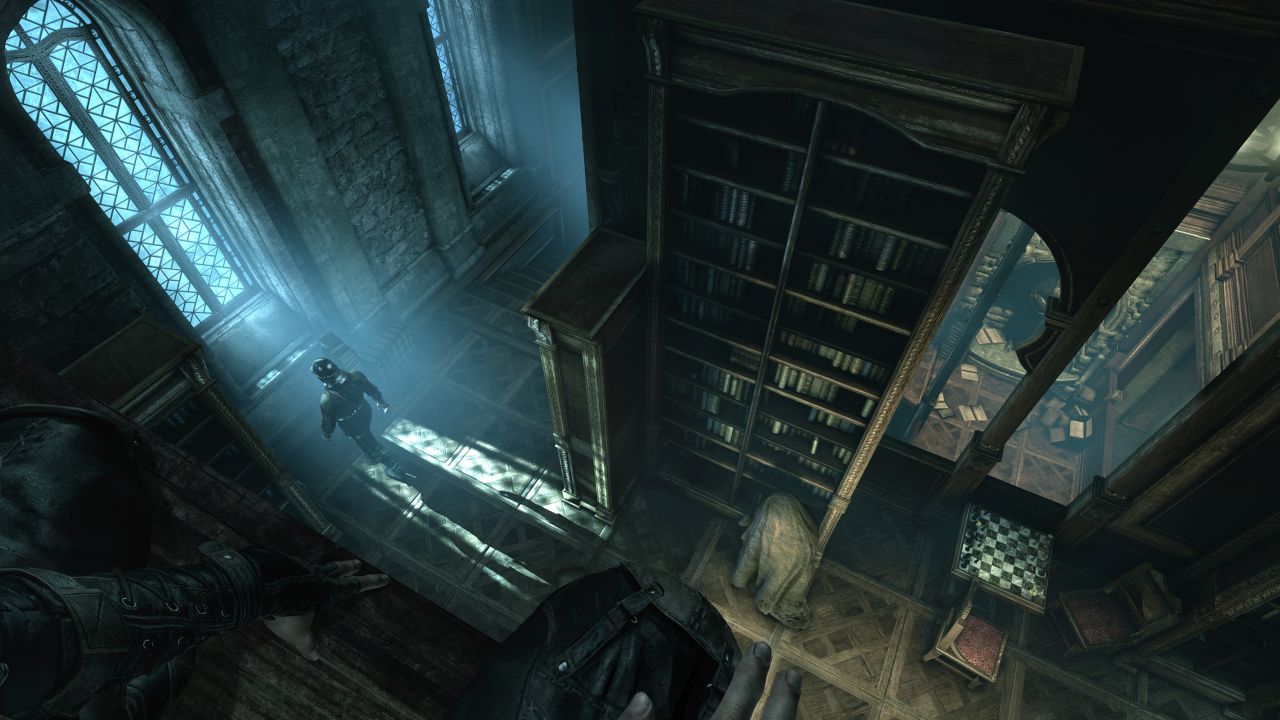
Let's start by stepping back into the leather boots of Garrett, who is now cool. He always was cool, of course – a talented loner, a fantasy reflection of his target audience, skulking around and making everybody around him a lot less wealthy while occasionally turning to deliver dry quips to the player – but evidently he wasn't cool enough for a gritty reboot like this because somebody at Eidos Montreal decided to ramp it up a notch. I can give or take him looking like a funeral-going ninja with that edgy face mask of his, and for the most part the new voice actor does a decent job of filling the gap left by the departure of Steven Russell's warm tones, but his character doesn't quite ring true anymore. He's still a cynical self-centered thief who constantly gets dragged into conflicts despite his best efforts to not care in the slightest, but the aspects get handled more heavily and self-aware, as if somebody out there was just going through a list of Garrett's character traits to make sure that fanboys weren't queuing to lob rocks through Eidos Montreal's windows. His dialogue and mannerisms, too, haven't survived the reboot unscathed, and now lean more towards the action-hero end of the spectrum. It doesn't make Garrett detestable, but it does make him harder to take seriously.
Enough. The City, too, has been given a light dusting of grit, taking all that next-gen eye candy and using it to lovingly render a selection of murky uninspired pseudo-Victorian locales, but so have the people who live in it, and I'm a lot less okay with this than I thought I would be. The guards of the earlier Thief games (and even the cultist nutjobs) were ordinary people, even a bit dozy: they went to the bear pits, knocked off early, got drunk and lost their keys at the bottom of the pool. In short, they provoked a certain amount of empathy, and this gave you all the more reason to avoid confrontations with them besides, you know, the fact that they would try to raise the alarm and kill you. Sure, they were usually in the employ of an absolute bastard, but you often got the impression that the only reason they hated you was because they had caught you half out of a window with all their valuables slung over your shoulder. By contrast, your foes in Thief are so comically brutish – presumably because somebody decided that they needed to make it look like Garrett was always in the moral right – that it becomes increasingly easy to just get lazy with the sneaking aspect and beat up anybody who gets in your way. All I'm saying is that it's a lot more natural to conform to Garrett's stealthy preferences if the people he's up against don't already deserve to end up lying face-down at their guard post with a golf-ball sized lump growing out of the back of their head.
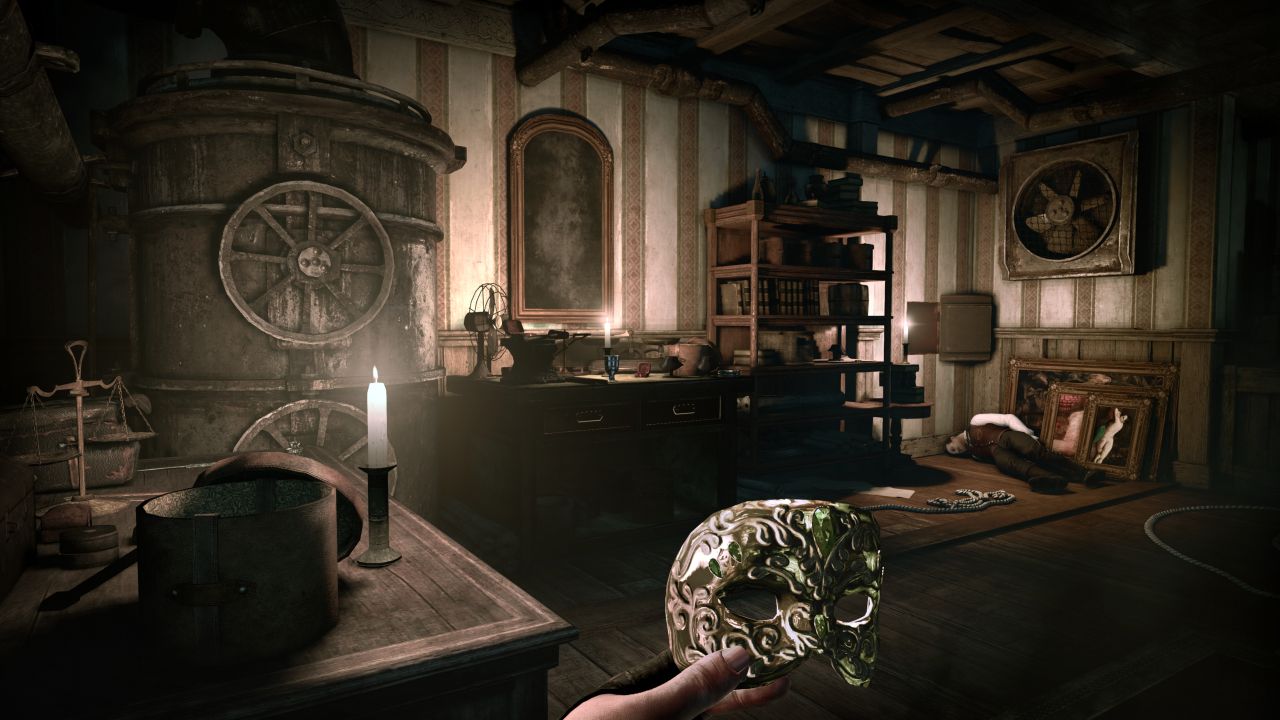
From petty complaint to more serious concern, Thief makes it crystal clear that it's not afraid to trample all over the canon with the biggest steel-capped boots it can find. There are no Mechanists, no Pagans, no Keepers, no returning members of the City Watch (wave a tearful goodbye to Officer Benny, everybody) and the Hammerites are referenced precisely once in a very conciliatory manner that treats continuity with a lack of respect not usually seen outside of the superhero comic industry. I don't think anybody even called me a taffer at any point. In their place we have the return of Basso the Boxman, the rise of a vague revolutionary conglomerate run by a man who looks like he's in dire need of a bath – which, given the fantasy era that we're operating out of, could well be the case – and a hot-headed sidekick called Erin who, to the sound of several packed theaters exhaling collective sighs of relief, disappears off the face of the earth about five minutes into the game after the tutorial mission goes horribly awry. Garrett himself gets knocked out in the same accident after a sizable falling chunk of masonry attempts to make friends with his skull, then wakes up a year later, being drawn through the city streets on a cart with that ever-present videogame protagonist disease: acute selective memory loss. How convenient. The City is now under the iron fist of a totalitarian ruler known as the Baron – who does, to be fair, provide reasonable justification for why all the watchmen are now slimy hand-picked cankers on a severe power trip – and has also been infested by a mysterious plague that's causing the widespread decline of the oppressed underclass and oppressive elite alike. Hey, Dishonored, toddle over here for a second. Does any of this last bit sound familiar to you?
Even putting the similarities to Dishonored – and the complete obliteration of the colourful array of factions that once fought over the City – out of the way, Thief's writing isn't anything particularly compelling. Finding out what happened to Erin – a character who, may I remind you, stays in your company just long enough to get annoying before tragedy strikes – is Garrett's main motivation throughout most of the plot, so the game essentially says “Hey, look at this impulsive, arrogant, morally-bankrupt fool who single-handedly fumbled a heist and nearly got you killed. Now, empathise with her!” Maybe I could have done so, via the extensive and somewhat overwrought character development sequences that she gets throughout the game, if the second half of Thief hadn't gradually drifted off the track of reason and off into a foul-smelling ditch somewhere. From a relatively stable standpoint, the story slowly descends into a pudgy miasma of inexplicable twists, questionable motivations and plot holes that not even the increased reliance on supernatural elements can fill, culminating in a lackluster ending with so many loose ends and unanswered questions that you can almost see the inevitable DLC storylines falling into place. There's a bit more of a focus on horror this time around, and even a surprisingly unnerving level set in a recently-vacated insane asylum, but while I'm happy to see any game that understands that there's more to horror than just carving up fleshy monstrosities with a chainsaw strapped to each extremity, all it really does is get in the way of the meat of the game: good honest thieving.
Gameplay is where the most innovation has been made, for want of a more appropriate word. As expected, there are a bunch of modern amenities that do their best to give new players a warm motherly hug, just in case the prospect of an unfamiliar IP with alien gameplay scares them off – a minimap, objective markers, alert indicators, a button that essentially combines bullet time with Batman's detective vision. To their credit, Eidos Montreal do grant you the option to turn all of that off, which I leapt at the chance to, although the exclusion of that last feature became something of a problem when the game started throwing in some of those classic 'find the hidden button' puzzles. Basic mechanics have been streamlined quite a bit, removing the sword, relegating the blackjack to a dedicated melee button and essentially eliminating the inventory, all of which make the game a lot less clunky if a bit on the easy side. There's a swoop move that allows you to quickly and quietly dash short distances – again, not helping against the case that the 2014 Thief is a great deal more forgiving than its forebears – and there are a few really clever little touches that genuinely do add to the game, like being able to lean over railings without actually having to leap astride them like a hyperactive circus performer, or having to watch that you don't knock fragile objects to the floor and make a resulting racket, or the way guards will now actually notice when the room they were patrolling in suddenly contains less gold than a litre of seawater. It's also pleasing to see that Thief hasn't caved to the increasingly common trend of tacking token RPG elements onto everything, though there are other issues in that vein that we'll get to in due time.
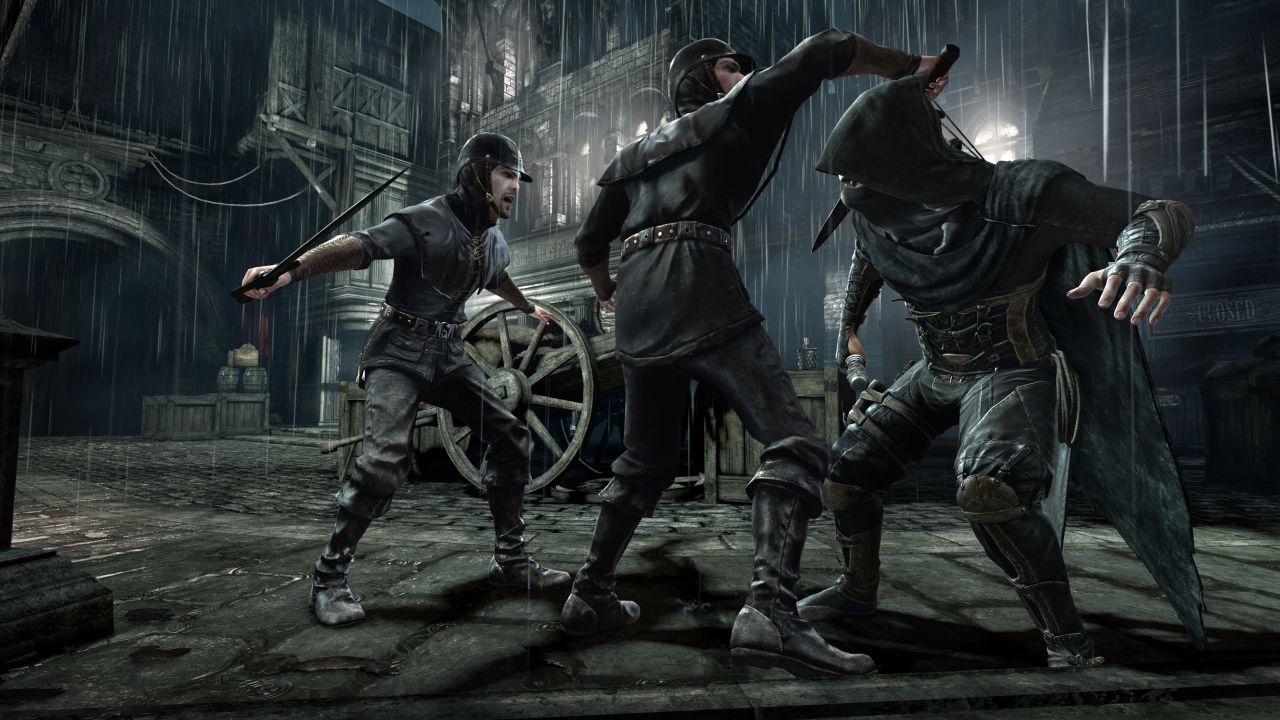
That's about the end of the praise, sadly. One of the optional gameplay features that I found myself unable to do without was the contextual button indicators, because Thief is a game that's practically built around them. Now, contextual button functions are sort of an understandable feature in some games, especially when you've run out of buttons and there's no reason to expect that the character will simultaneously need to quick-fire their lightning spell and seduce a nearby NPC, but Thief's approach is both offensively restrictive and downright badly designed. You can't jump or mantle at all, you see, unless you're positioned in front of a ledge, or a perfectly proportioned obstacle, or a gap that was specifically intended to be jumped. Presumably this was an attempt to remove the nightmarish task in the earlier games of having to perfectly execute parkour jumps while under the influence of those tricky Dark engine movement physics – which were like walking everywhere with your feet trapped in lumps of freshly-kneaded dough – but removing the task altogether just smacks of somebody giving up far too early. What's the point of even having something like this in the game if it's been made impossible to fail? There's no challenge involved, that's for certain, unless you count working out what the game will and won't count as a jump cue. So I suppose it is possible to fail: all you have to do is try to do something that the developers didn't think of, or just plain didn't want you to do.
Want to jump from rooftop to rooftop at a non-standard angle? Don't bother, the game will assume you just wanted to jump off the building. Want to jump over that patch of broken glass? Not allowed, I'm afraid, unless you want to make it sound like there was a catastrophic accident at the bottle recycling plant. You shall have to find a way around. Want to clamber over this stack of crates? Sorry, those crates don't conform to regulation dimensions, so I'm afraid all you can do is bump into them like an angry steampunk vacuum robot. And worst of all, Thief doesn't even make the effort to stay consistent. Do you want to know the difference between an edge you can clumsily walk straight off, an edge that you have to manually drop off with a contextual button press, and an edge where your only option is to stand there like a lemon, cursing the person who invented the invisible wall? Well so would I, because it's certainly not apparent to the naked eye.
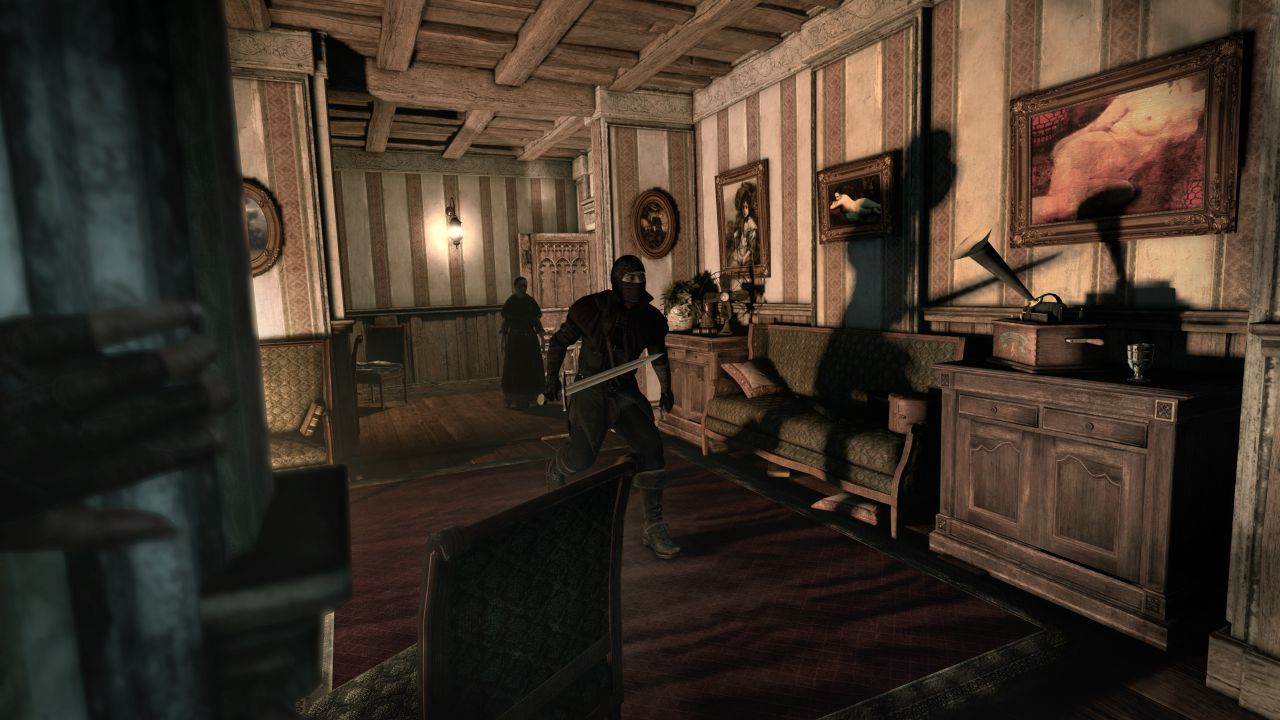
My hopes were buoyed, however briefly, by the acquisition of a grappling gizmo early in the game, but it shares the same contextual problem as the jump button in that it can only ever be used in specific spots to scale specific obstacles – in this case, directly in front of metal grates and out-of-reach ladders, both gifted with a tendency to glow blue because otherwise you'd never spot them with Thief's environmental colour palette of grey, brown and another grey – and the occasional linear scripted climbing segment. It's all so woefully inorganic, so relentlessly over-designed that there's no room for the player to innovate or pull things off that the development team hadn't anticipated. I mean honestly, it's a grappling hook for all intents and purposes. Why would you take a great concept like that and drag it down until it just becomes a method for scaling certain segments of walls that are about a meter taller than the others?
The grapple is just one of a few new items that Garrett gets to play with, but the only one he gets for free. The rest must be bought from a sketchy merchant for not-inconsiderable sums of gold, along with various upgrades for your bow and other equipment and... hang on, hand me that butterfly net. I think I've found the token RPG elements.
No, really. You can swap out the experience points for gold but the fact remains that you are being offered a set of permanent upgrades to central parts of Garrett's kit with the option to specialise in whatever you feel makes the most of your playing style, which to me paints 'token RPG elements' across the bathroom wall in dripping red letters. This argument is backed up by the little evaluation screen at the end of every mission, which will grant you bonus gold for things like not being seen – because that makes complete sense – and the inclusion of some side-questing nonsense which lets you upgrade your Garrett-vision. It's a great deal more convoluted than just earning experience points and spending them accordingly, but the principle is the same. Purchasing these new tools becomes your main incentive to steal as much gold as possible – well, that and ammunition for your bow, but that really isn't a problem unless you're on the highest difficulty – because without it you quickly find your options becoming increasingly limited. Without the wrench you can't open vents or steal plaques, without the wire-cutters you can't disable traps, without the razor you can't cut out paintings or shave your chin, and so on. Can't this, can't that. Why are you erecting all these pointless barriers in my way, Thief? Why would you want to actively detract from the experience until I've jumped through these hoops? And really, a wrench? Did Garrett, a man capable of carrying an entire solid-gold cutlery set on his back without expelling a single grunt of complaint, really think that in the course of his work it would never benefit him to bring such a basic tool along? It's infinitely more useful than that silly compound bow, at any rate, especially since you can put out candles just by idly wafting you hands over them.
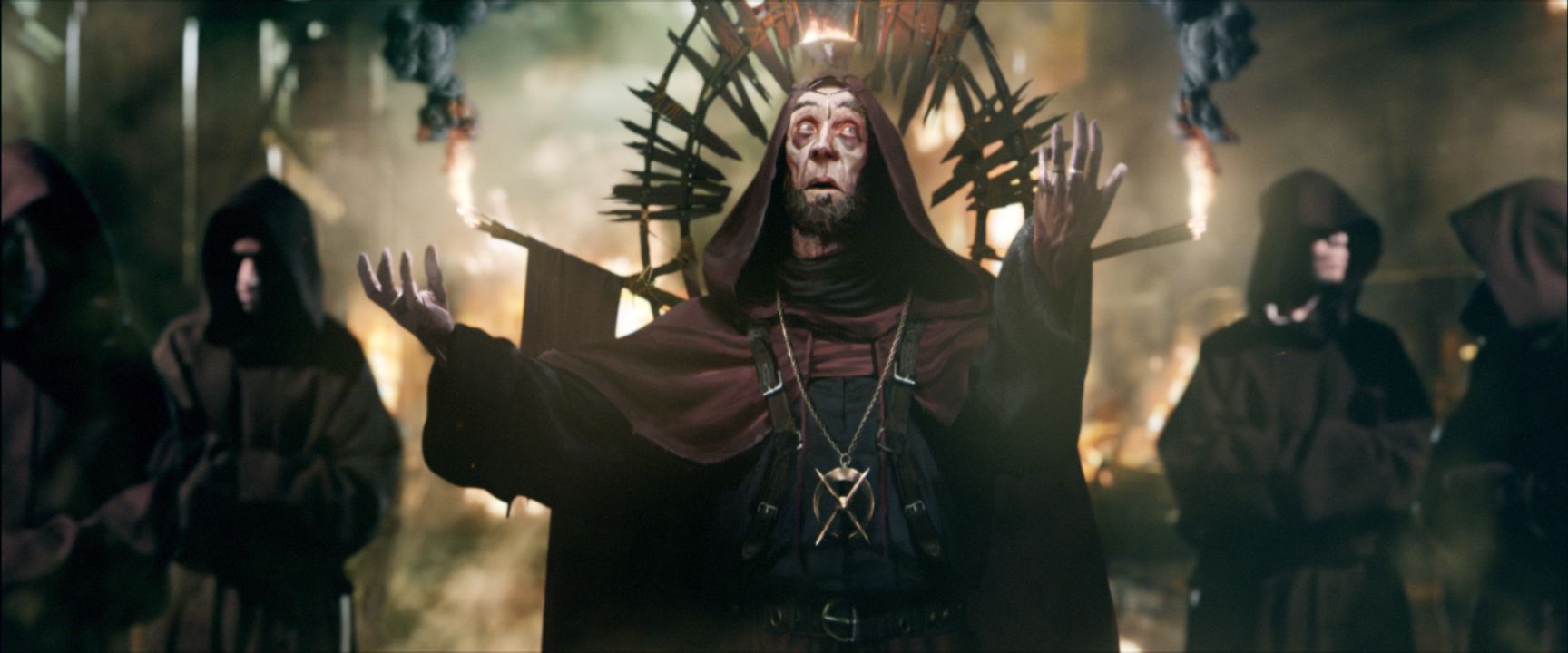
Garrett has also apparently swapped out his tap-dancing boots for a set of nice comfortable slippers, greatly increasing the speed at which he can move across various surfaces without alerting anybody, and am I the only person who feels that this is a massive step backwards? Yes, it was kind of unrealistic that you couldn't run across a tiled room without bringing every single person in the building down on you, but it added a whole extra dimension to the levels and how you approached them. You had to look at a room and weigh up the various combinations of light and floor surfaces to work out how you tackled it. Is it worth the risk of crawling across that metal grate and potentially alerting a nearby guard? What areas can I safely move around in if something comes patrolling through here? Now practically all you have to worry about is your light gem and the occasional obvious patch of water or broken glass, and it really removes a lot of depth from the gameplay, to say nothing of the effective tension of trying to creep behind somebody's back and praying they don't hear you. When you can run across a marble lobby in a Thief game without any fear of reprieve, it's hard not to smell a big rotten over-simplifying rat.
Of course, just because you did manage to sneak across to the solitary patch of shadow in the room while walking across a floor made from bubble wrap and Rice Krispies doesn't mean that you're necessarily safe in Thief. Having a big luxurious budget and the wonders of modern graphical technology evidently went to somebody's head because everything Garrett does has a lovely little pre-animated action for it, and the dormant issues that result from this soon raise their ugly heads. Say I'm crouched in the shadow of a big oak desk when I spot a drawer on it I'd like to worm my fingers into. Garrett can't just silently slip the drawer open from his current position, or even reach around the corner and fumble with it. Instead, he has to slip out of his safe location, stand up, position himself directly in front of the drawer (no matter how many spotlights, security cameras, crossbows and orbital laser cannons might be trained upon it) and open it up, taking great care to show his hands delicately slipping it open. This applies to everything, even causing you to lean forward momentarily when you reach out to grab minor bits of loot, and I honestly cannot think of a single good reason for this feature to exist. It breaks the flow of literally every minor action in the game, it takes control away from the player, and for what? So we can see Garrett's spidery hands greedily grabbing everything we rub our 'use' button on with those glistening next-gen graphics? It's alright Eidos Montreal, I won't lose my immersion just because I can't actually watch myself stuffing all that pricey dinnerware into a sack. Brains can fill in the blanks for that sort of thing just fine. It's not game-breaking, but it's just another annoyance that I couldn't let slide, especially given how indicative it is of Thief's dictatorial tendencies.
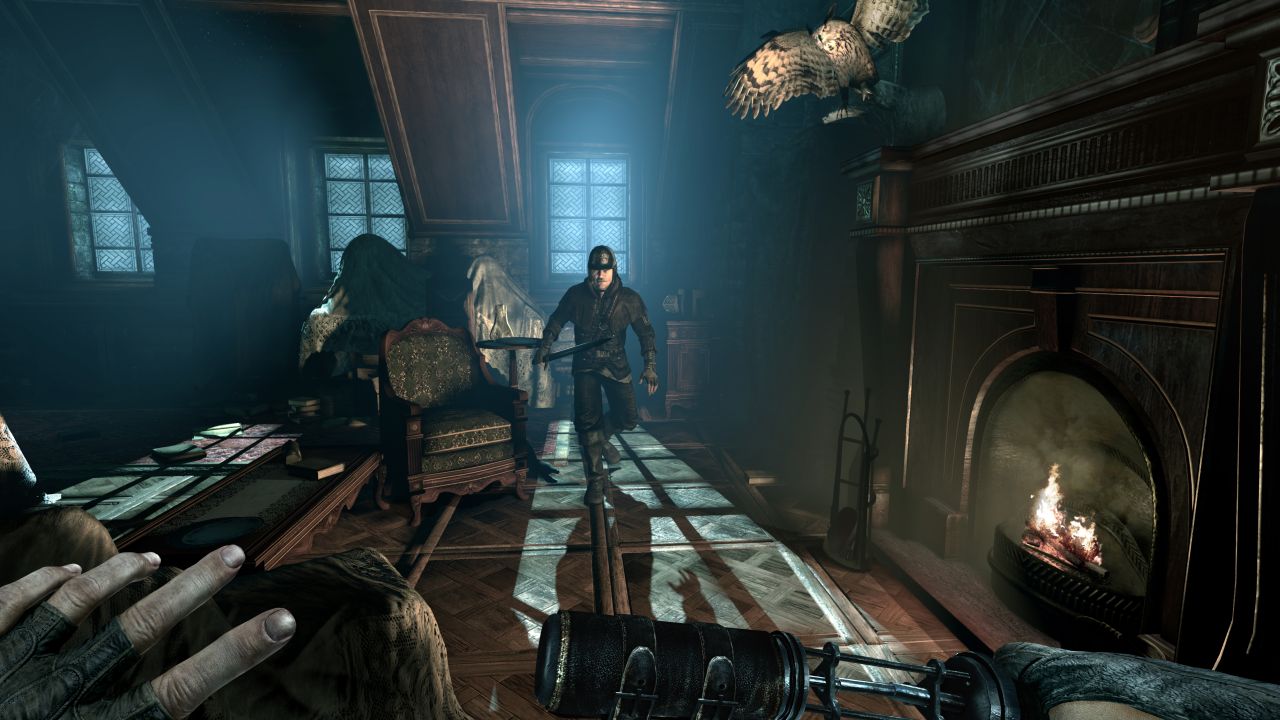
Now, here's a quick spot test for those of you out there with Garrett figurines sitting proudly on your bedside tables. I want you to find a scrap of paper on your desk – I don't know, tear out the back page of your Game of Thrones book or something – and write down the best features, in your opinion, of the Thief games. Finished? Right, did you write 'enormous sprawling non-linear levels' in spiky block capitals? Because Eidos Montreal, for whatever mind-melting reason, didn't. Levels range from slightly disappointing to positively titchy and often consist of little more than a set of small arenas set up in linear succession, a problem that Thief shares with its predecessor, Deadly Shadows. There's nothing that comes even close to the expansive indulgence of something like the Shoalsgate Station or First City Bank missions from Thief II (whatever your precious pre-order bonus blurb might have told you) and while there are quite a few levels with a genuinely non-linear structure, they usually only have a handful of viable paths throughout them, a number of which will swiftly disappear if you didn't bring the bloody wrench along. One could argue that this decision was done in order to provide a tighter storytelling focus, but since we have already established that the story is pants, this is something of a lost cause.
Also back from Deadly Shadows are side-missions and the ability to freely roam the City, the latter of which was probably the peak of this game for me as far as entertainment is concerned. Exploring the streets, dodging patrols of watchmen and climbing into upstairs windows provides a nice homogeneous layer of solid burglary to fill the gaps between missions and grant you a little bit of extra gold on the side. But there's very little tension or sense of any kind of threat about it: guards are rare, citizens won't tattle on you unless you look at them too menacingly, and even if you end up with half the district in hot pursuit of you, there are any number of easy viable escape routes at your disposal. I was going to make a joke about how you could probably evade your foes just by running very quickly in a straight line, but unfortunately that doesn't really work because the City has been designed in the haphazard grand tradition of sprawling pre-industrial cities, and is therefore incredibly unintuitive to navigate when one has a specific destination in mind. The poorly-disguised loading zones don't help either.
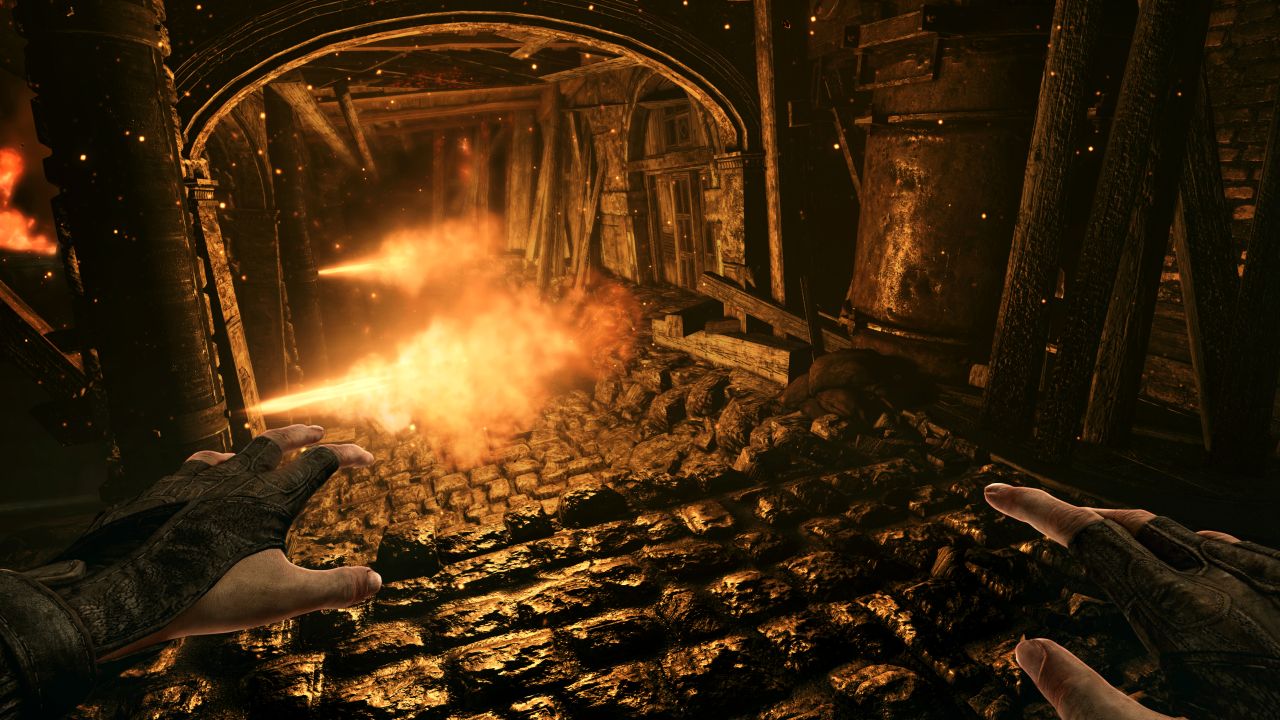
This might seem like an odd point to make, but there's something really strange going on with Thief's sound design, in that the apparent volume and clarity of a sound often seems completely arbitrary. Several times I was startled by somebody speaking into my ear only to find, after some investigation, that they were actually on the far side of a brick wall, or taped into a dustbin, or in another postcode. Occasionally I would make a noise that was almost inaudible to me – missing a tumbler on a lock, for example – only to find that I had inadvertently telegrammed my exact position to every guard within a six mile radius, while in other situations I was practically setting off fireworks behind their backs with no response. Once I accidentally slipped off a rooftop – mostly because the contextual jump command was feeling spiteful and decided to try to kill me again – and I swear I landed right behind a watchman, close enough to count the plague boils on the back of his neck, without alerting him. Now, I don't know about you, but I don't see how it's possible to accidentally fall off a building without making a few noises, and probably some smells too. I suppose it's possible that he had been suddenly assaulted by an audio cue, because for some inane reason the default ambient music volume is loud enough to drown out all but the most stubbornly projected of dialogue lines.
Maybe if that had been the limit of Thief's technical problems, it could have still gotten out of here with the smallest, most disgruntled of non-committal recommendations, but fate – or rather, Thief's QA program – has decreed otherwise. How petty and entitled it seems to complain about the relative volume of dialogue when entire lines of it start to disappear into the ether, or when the cutscenes that house it start to fluctuate in speed like a malfunctioning electric wheelchair. The framerate remained buoyantly above sixty for the most part, sailing high and dry on the black monolithic PC from which I extract all my earthly gratification, but tragedy would occasionally strike in the form of crippling, post-loading-screen slowdowns. Merely entering several select areas was enough to do to that comfortably high framerate what a swimming pool full of gravel does to a runaway lorry. I know hyperbole is loads of fun when we're talking about this sort of thing, but I really did have the time to get up, walk away, and make a cup of tea while I waited for Thief to finish whatever agonizing piece of long division had caused it to grind to a halt. As a matter of fact – given that this game will easily stretch to fourteen hours even if you pay minimal attention to all the side-missions, and probably double that otherwise – that was usually exactly what I did. You don't even want to know what I ended up drinking when the game decided to nuke my save file about three hours in and forced me to start over.
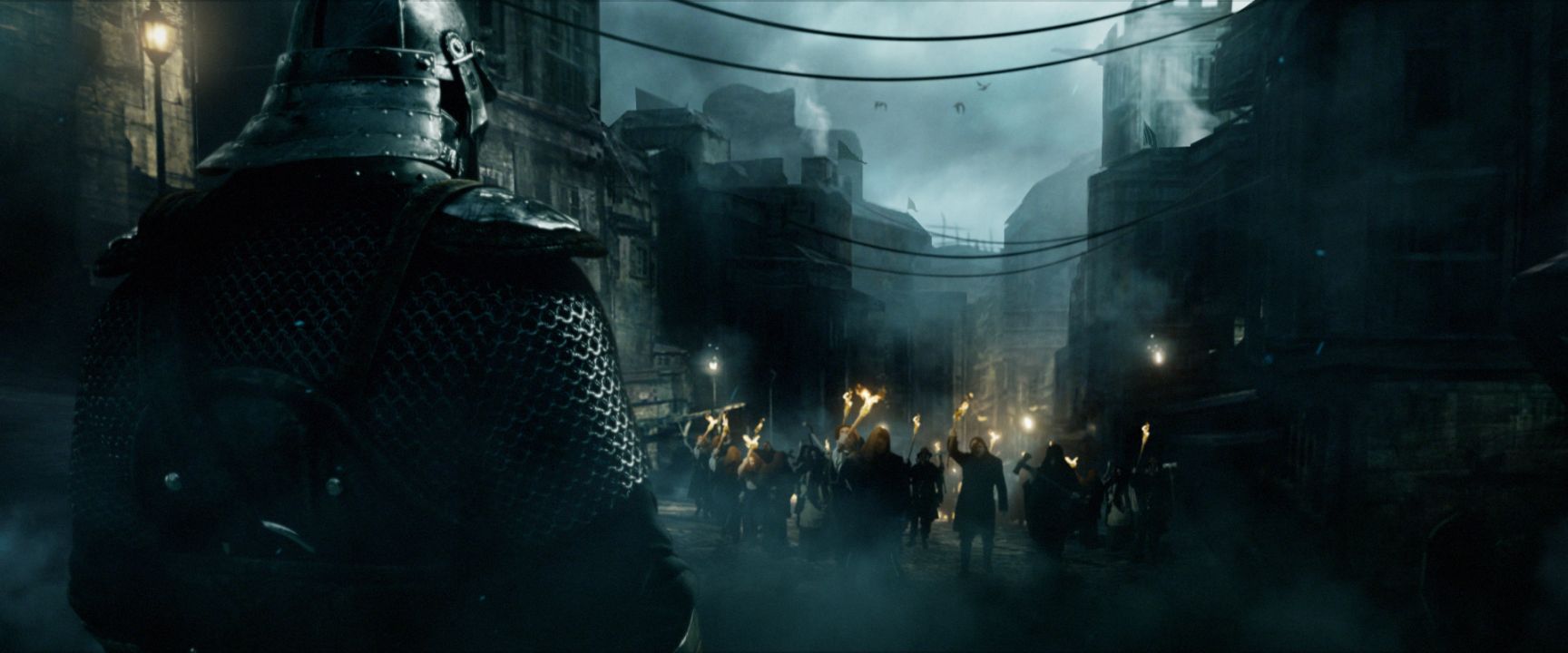
The standard route with disappointing reboots like this is usually to say something along the lines of “If this had been released under a new IP instead of polluting an old beloved one, I would have liked it”, but that really isn't the case with Thief. Being in the unfortunate position of having to be compared to its predecessors certainly didn't do Thief any favours, but even as a standalone game it flops. The movement system is frustratingly restrictive, the levels are small and often entirely linear, the story feels clumsily stitched-together, and when all's said and done it's all just a bit lacking in polish. How truly saddening to see the reboot of a genre-defining game fail to grasp its strengths even while its competitors – Dishonored, even Eldritch I'd be willing to argue – expand on them. Thief's only concession to expansion is that it is bloated well beyond the bounds of reason.
 Comments
Comments

















